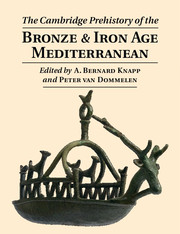Book contents
- The Cambridge Prehistory of the Bronze and Iron Age Mediterranean
- The Cambridge Prehistory of the Bronze and Iron Age Mediterranean
- Copyright page
- Contents
- Illustrations
- Contributors
- Preface
- Mediterranean Introductions
- Insularity and Connectivity
- 1 A Little History of Mediterranean Island Prehistory
- 2 Inside Out? Materiality and Connectivity in the Aegean Archipelago
- 3 Early Island Exploitations: Productive and Subsistence Strategies on the Prehistoric Balearic Islands
- 4 Islands and Mobility: Exploring Bronze Age Connectivity in the South-Central Mediterranean
- 5 Sicily in Mediterranean History in the Second Millennium BC
- 6 Late Bronze Age Sardinia: Acephalous Cohesion
- Mobility, Migration and Colonisation
- Hybridisation and Cultural Encounters
- Materiality, Memory and Identity
- Community and Household
- Life and Death
- Ritual and Ideology
- Index
1 - A Little History of Mediterranean Island Prehistory
from Insularity and Connectivity
Published online by Cambridge University Press: 18 December 2014
- The Cambridge Prehistory of the Bronze and Iron Age Mediterranean
- The Cambridge Prehistory of the Bronze and Iron Age Mediterranean
- Copyright page
- Contents
- Illustrations
- Contributors
- Preface
- Mediterranean Introductions
- Insularity and Connectivity
- 1 A Little History of Mediterranean Island Prehistory
- 2 Inside Out? Materiality and Connectivity in the Aegean Archipelago
- 3 Early Island Exploitations: Productive and Subsistence Strategies on the Prehistoric Balearic Islands
- 4 Islands and Mobility: Exploring Bronze Age Connectivity in the South-Central Mediterranean
- 5 Sicily in Mediterranean History in the Second Millennium BC
- 6 Late Bronze Age Sardinia: Acephalous Cohesion
- Mobility, Migration and Colonisation
- Hybridisation and Cultural Encounters
- Materiality, Memory and Identity
- Community and Household
- Life and Death
- Ritual and Ideology
- Index
Summary
- Type
- Chapter
- Information
- Publisher: Cambridge University PressPrint publication year: 2015
- 5
- Cited by



